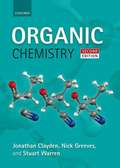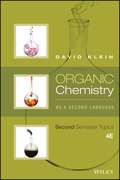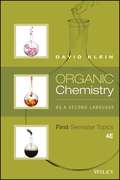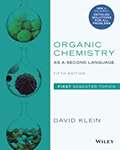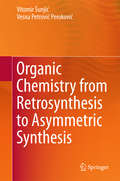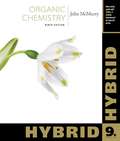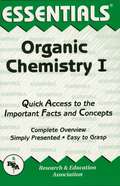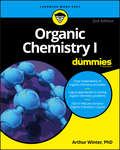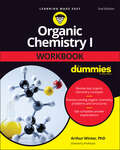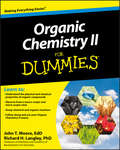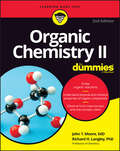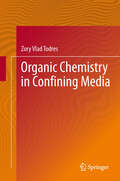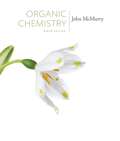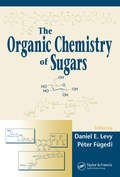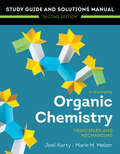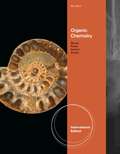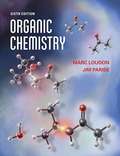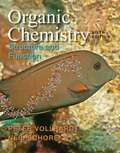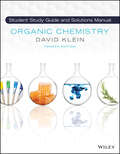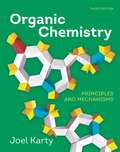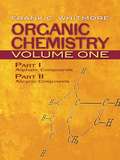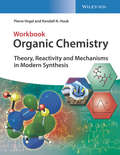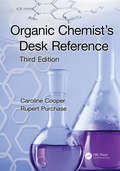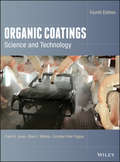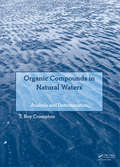- Table View
- List View
Organic Chemistry 2nd Edition
by Jonathan Clayden Nick Greeves Stuart WarrenLike the first, the second edition is built on three principles: An explanatory approach, through which the reader is motivated to understand the subject and not just learn the facts; A mechanistic approach, giving the reader the power to understand compounds and reactions never previously encountered; An evidence-based approach, setting out clearly how and why reactions happen as they do, giving extra depth to the reader's understanding.
Organic Chemistry As A Second Language: Second Semester Topics
by David KleinReaders continue to turn to Klein's Organic Chemistry As a Second Language: Second Semester Topics, 4th Edition because it enables them to better understand fundamental principles, solve problems, and focus on what they need to know to succeed. The fourth edition explores the major principles in the field and explains why they are relevant. It is written in a way that clearly shows the patterns in organic chemistry so that readers can gain a deeper conceptual understanding of the material. Topics are presented clearly in an accessible writing style along with numerous hands-on problem solving exercises.
Organic Chemistry As A Second Language: First Semester Topics
by David R. KleinOrganic Chemistry may be challenging, but that doesn't mean you can't get the grade you want. With David Klein's Organic Chemistry as a Second Language: Translating the Basic Concepts, you'll be able to better understand fundamental principles, solve problems, and focus on what you need to know to succeed. <P><P> Here's how you can get a better grade in Organic Chemistry: <P><P> <P><P>Understand the Big Picture. Organic Chemistry as a Second Language points out the major principles in Organic Chemistry and explains why they are relevant to the rest of the course. By putting these principles together, you'll have a coherent framework that will help you better understand your textbook. <P><P> <P><P>Study More Efficiently and Effectively Organic Chemistry as a Second Language provides time-saving study tips and a clear roadmap for your studies that will help you to focus your efforts. <P><P> <P><P>Improve Your Problem-Solving Skills <P><P>Organic Chemistry as a Second Language will help you develop the skills you need to solve a variety of problem types-even unfamiliar ones!
Organic Chemistry As A Second Language: First Semester Topics
by David R. KleinOrganic chemistry can be a challenging subject. Most students view organic chemistry as a subject requiring hours upon hours of memorization. Author David Klein's Second Language books prove this is not true—organic chemistry is one continuous story that actually makes sense if you pay attention. Offering a unique skill-building approach, these market-leading books teach students how to ask the right questions to solve problems, study more efficiently to avoid wasting time, and learn to speak the language of organic chemistry. Covering the initial half of the course, Organic Chemistry as a Second Language: First Semester Topics reviews critical principles and explains their relevance to the rest of the course. Each section provides hands-on exercises and step-by-step explanations to help students fully comprehend classroom lectures and textbook content. Now in its fifth edition, this valuable study resource covers the characteristics of molecules, the nature of atomic bonds, the relationships between different types of molecules, drawing and naming molecules, and essential molecular reactions.
Organic Chemistry from Retrosynthesis to Asymmetric Synthesis
by Vitomir Šunjić Vesna Petrović PerokovićThis book connects a retrosynthetic or disconnection approach with synthetic methods in the preparation of target molecules from simple, achiral ones to complex, chiral structures in the optically pure form. Retrosynthetic considerations and asymmetric syntheses are presented as closely related topics, often in the same chapter, underlining the importance of retrosynthetic consideration of target molecules neglecting stereochemistry and equipping readers to overcome the difficulties they may encounter in the planning and experimental implementation of asymmetric syntheses. This approach prepares students in advanced organic chemistry courses, and in particular young scientists working at academic and industrial laboratories, for independently solving synthetic problems and creating proposals for the synthesis of complex structures.
Organic Chemistry, Hybrid Ninth Edition
by John McmurryMaster organic chemistry with the help of this proven best-seller! John McMurry's ORGANIC CHEMISTRY is consistently praised as the most clearly written book available for the course.
Organic Chemistry I Essentials
by The Editors of REA Adrian DingleREA's Essentials provide quick and easy access to critical information in a variety of different fields, ranging from the most basic to the most advanced. As its name implies, these concise, comprehensive study guides summarize the essentials of the field covered. Essentials are helpful when preparing for exams, doing homework and will remain a lasting reference source for students, teachers, and professionals. Organic Chemistry I includes structure and properties, alkanes, alkenes, alkynes, alkyl halides, stereochemistry, cyclic hydrocarbons, aromatic hydrocarbons, aryl halides, ethers and epoxides, alcohols and glycols, and carboxylic acids.
Organic Chemistry I For Dummies
by Arthur WinterThe easy way to take the confusion out of organic chemistryOrganic chemistry has a long-standing reputation as a difficult course. Organic Chemistry I For Dummies takes a simple approach to the topic, allowing you to grasp concepts at your own pace.This fun, easy-to-understand guide explains the basic principles of organic chemistry in simple terms, providing insight into the language of organic chemists, the major classes of compounds, and top trouble spots. You'll also get the nuts and bolts of tackling organic chemistry problems, from knowing where to start to spotting sneaky tricks that professors like to incorporate.Refreshed example equationsNew explanations and practical examples that reflect today's teaching methodsFully worked-out organic chemistry problemsBaffled by benzines? Confused by carboxylic acids? Here's the help you need--in plain English!
Organic Chemistry I Workbook For Dummies
by Arthur WinterNeed help with organic chemistry? Get extra practice with this workbook If you’re looking for a little extra help with organic chemistry than your Organic Chemistry I class offers, Organic Chemistry I Workbook For Dummies is exactly what you need! It lets you take the theories you’re learning (and maybe struggling with) in class and practice them in the same format you’ll find on class exams and other licensing exams, like the MCAT. It offers tips and tricks to memorize difficult concepts and shortcuts to solving problems. This reference guide and practice book explains the concepts of organic chemistry (such as functional groups, resonance, alkanes, and stereochemistry) in a concise, easy-to-understand format that helps you refine your skills. It also includes real practice with hundreds of exam questions to test your knowledge. Walk through the answers and clearly identify where you went wrong (or right) with each problem Get practical advice on acing your exams Use organic chemistry in practical applications Organic Chemistry I Workbook For Dummies provides you with opportunities to review the material and practice solving problems based on the topics covered in a typical Organic Chemistry I course. With the help of this practical reference, you can face down your exam and pass on to Organic Chemistry II with confidence!
Organic Chemistry II For Dummies
by John T. Moore Richard LangleyA plain-English guide to one of the toughest courses around So, you survived the first semester of Organic Chemistry (maybe even by the skin of your teeth) and now it's time to get back to the classroom and lab! Organic Chemistry II For Dummies is an easy-to-understand reference to this often challenging subject. Thanks to this book, you'll get friendly and comprehensible guidance on everything you can expect to encounter in your Organic Chemistry II course. An extension of the successful Organic Chemistry I For Dummies Covers topics in a straightforward and effective manner Explains concepts and terms in a fast and easy-to-understand way Whether you're confused by composites, baffled by biomolecules, or anything in between, Organic Chemistry II For Dummies gives you the help you need - in plain English!
Organic Chemistry II For Dummies
by John T. Moore Richard H. LangleyWith Dummies at your side, you can conquer O-chem Organic chemistry is, well, tough. With Organic Chemistry II For Dummies, you can (and will!) succeed at one of the most difficult college courses you’ll encounter. We make the subject less daunting in the second semester, with a helpful review of what you learned in Organic Chemistry I, clear descriptions of organic reactions, hints for working with synthesis and roadmaps, and beyond. You’ll love the straightforward, effective way we explain advanced O-chem material. This updated edition is packed with new practice problems, fresh examples, and updated exercises to help you learn quickly. Observe from a macroscopic and microscopic view, understand the properties of organic compounds, get an overview of carbonyl group basics, and everything else you’ll need to pass the class. Organic Chemistry II For Dummies is packed with tips to help you boost your exam scores, stay on track with assignments, and navigate advanced topics with confidence. Brush up on concepts from Organic Chemistry I Understand the properties of organic compounds Access exercises and practice questions to hone your knowledge Improve your grade in the second semester of Organic ChemistryOrganic Chemistry II For Dummies is for students who want a reference that explains concepts and terms more simply. It’s also a perfect refresher O-chem veterans preparing for the MCAT.
Organic Chemistry in Confining Media
by Zory Vlad TodresZory Vlad Todres' monograph offers a fresh insight into an important and developed area of organic chemistry. Calixarene, cyclodextrins, and cucurbiturils as host molecules are well known, but the corresponding new and demonstrative publications deserve new exposition. This book principally widens our consideration of organic reactivity in confining media. Topics discussed include: effects of micellization, porous effects, effects of solvent cages, complexation to organometallic compounds, hydrogen-bond or charge-transfer complexation, sorption effects, effects of solvents, and stereochemical changes upon confinement. Organic Chemistry in Confining Media is useful for experienced organic chemists working in academia or industry, as well as chemists working in fields contiguous to organic chemistry.
Organic Chemistry (Ninth Edition)
by John McmurryJohn McMurry makes learning of Organic Chemistry as enjoyable as he experienced while writing this book.
The Organic Chemistry of Sugars
by Daniel E. Levy Péter FügediIntrigued as much by its complex nature as by its outsider status in traditional organic chemistry, the editors of The Organic Chemistry of Sugars compile a groundbreaking resource in carbohydrate chemistry that illustrates the ease at which sugars can be manipulated in a variety of organic reactions. Each chapter contains numerous examples demonst
Organic Chemistry (Second Edition): Study Guide/solutions Manual
by Joel KartyUnderstand more, memorize less.
Organic Chemistry (Sixth Edition)
by William Henry Brown Eric Anslyn Brent L. Iverson Christopher S. FooteRenowned for its unified mechanistic themes, emphasis on biological examples, use of applied problems from the pharmaceutical field, and unrivaled full-color visuals, ORGANIC CHEMISTRY, Sixth Edition, delivers cutting-edge coverage packed with reader-friendly features. Offering a clear presentation, the book offsets reaction mechanisms in a stepwise fashion and emphasizes similarities between related mechanisms, using just four different characteristics: breaking a bond, making a new bond, adding a proton and taking a proton away.
Organic Chemistry, Sixth Edition
by Marc Loudon Jim PariseThis edition contains over 1,600 problems--many of them new and taken directly from the scientific literature. It provides students with more health examples drawn from modern medical practice, as well as many cutting-edge topics from modern synthetic organic chemistry.
Organic Chemistry Structure and Function
by K. Peter C. Vollhardt Neil E. SchoreWith authors who are both accomplished researchers and educators, Vollhardt and Schore's Organic Chemistry is proven effective for making contemporary organic chemistry accessible, introducing cutting-edge research in a fresh, student-friendly way. A wealth of unique study tools help students organize and understand the substantial information presented in this course. And in the sixth edition, the themes of understanding reactivity, mechanisms, and synthetic analysis to apply chemical concepts to realistic situations has been strengthened. New applications of organic chemistry in the life sciences, industrial practices, green chemistry, and environmental monitoring and clean-up are incorporated. This edition includes more than 100 new or substantially revised problems, including new problems on synthesis and green chemistry, and new "challenging" problems.
Organic Chemistry: Student Solution Manual and Study Guide
by David KleinSuccess in organic chemistry requires mastery in two core aspects: fundamental concepts and the skills needed to apply those concepts and solve problems. With Organic Chemistry, Student Solution Manual and Study Guide, 4th Edition, students can learn to become proficient at approaching new situations methodically, based on a repertoire of skills. These skills are vital for successful problem solving in organic chemistry.
Organic Chemistry (Third Edition): Principles And Mechanisms
by Joel KartyMotivate every student to think about, practice, and apply organic chemistry. Joel Karty helps students succeed in organic chemistry, and our adopters overwhelmingly agree that his mechanistically organized approach works. The Third Edition includes a new video series that models the critical thinking skills that students need to master. Redesigned, two-column Solved Problems then coach students in applying those critical thinking skills to solving chemical equations, which helps them avoid overreliance on memorization. Interactive features in the book and Smartwork consistently give students opportunities to practice what they’ve learned. This purchase offers access to the digital ebook only.
Organic Chemistry, Volume One: Part I: Aliphatic Compounds Part II: Alicyclic Compounds (Dover Books on Chemistry #1)
by Frank C. WhitmoreA rich source of chemical facts, theories, and processes, this two-volume series treats the entire subject of organic chemistry. It has served for decades as a reference for chemists in industry and education as well as a classroom text for students with a year or more of experience in organic chemistry.Volume One provides thorough coverage of aliphatic compounds, devoting 500 pages to the physical properties and various methods of synthetic preparation of hydrocarbons, halides, alcohols, ethers, carbohydrates, proteins, ketones, amines, monobasic acids, and many other related compounds. The second part of this volume discusses alicyclic compounds, with reactions, isomers, and processes given for terpenes, cyclopropane derivatives, carotenoids, and the cholane series. Methods of synthetic preparation receive a critical analysis, and many biochemical compounds are described.
Organic Chemistry Workbook: Theory, Reactivity and Mechanisms in Modern Synthesis (Topics In Current Chemistry Ser. #92)
by Pierre Vogel Kendall N. HoukProvides references and answers to every question presented in the primary Organic Chemistry textbook Successfully achieving chemical reactions in organic chemistry requires a solid background in physical chemistry. Knowledge of chemical equilibria, thermodynamics, reaction rates, reaction mechanisms, and molecular orbital theory is essential for students, chemists, and chemical engineers. The Organic Chemistry presents the tools and models required to understand organic synthesis and enables the efficient planning of chemical reactions. This volume, Organic Chemistry: Theory, Reactivity, and Mechanisms in Modern Synthesis Workbook, complements the primary textbook?supplying the complete, calculated solutions to more than 800 questions on topics such as thermochemistry, pericyclic reactions, organic photochemistry, catalytic reactions, and more. This companion workbook is indispensable for those seeking clear, in-depth instruction on this challenging subject. Written by prominent experts in the field of organic chemistry, this book: -Works side-by-side with the primary Organic Chemistry textbook -Includes chapter introductions and re-stated questions to enhance efficiency -Features clear illustrations, tables, and figures -Strengthens reader?s comprehension of key areas of knowledge Organic Chemistry: Theory, Reactivity, and Mechanisms in Modern Synthesis Workbook is a must-have resource for anyone using the primary textbook.
Organic Chemist's Desk Reference
by Caroline Cooper Rupert PurchaseLaunched in 1995 as a companion to the Dictionary of Organic Compounds, the Organic Chemist’s Desk Reference has been essential reading for laboratory chemists who need a succinct guide to the ‘nuts and bolts’ of organic chemistry — the literature, nomenclature, stereochemistry, spectroscopy, hazard information, and laboratory data. This third edition reflects changes in the dissemination of chemical information, revisions to chemical nomenclature, and the adoption of new techniques in NMR spectroscopy, which have taken place since publication of the last edition in 2011. Organic chemistry embraces many other disciplines — from material sciences to molecular biology — whose practitioners will benefit from the comprehensive but concise information brought together in this book. Extensively revised and updated, this new edition contains the very latest data that chemists need access to for experimentation and research.
Organic Coatings: Science and Technology
by Frank N. Jones Mark E. Nichols Socrates Peter PappasThe definitive guide to organic coatings, thoroughly revised and updated—now with coverage of a range of topics not covered in previous editions Organic Coatings: Science and Technology, Fourth Edition offers unparalleled coverageof organic coatings technology and its many applications. Written by three leading industry experts (including a new, internationally-recognized coatings scientist) it presents a systematic survey of the field, revises and updates the material from the previous edition, and features new or additional treatment of such topics as superhydrophobic, ice-phobic, antimicrobial, and self-healing coatings; sustainability, artist paints, and exterior architectural primers. making it even more relevant and useful for scientists and engineers in the field, as well as for students in coatings courses. The book incorporates up-to-date coverage of recent developments in the field with detailed discussions of the principles underlying the technology and their applications in the development, production, and uses of organic coatings. All chapters in this new edition have been updated to assure consistency and to enable extensive cross-referencing. The material presented is also applicable to the related areas of printing inks and adhesives, as well as areas within the plastics industry. This new edition Completely revises outdated chapters to ensure consistency and to enable extensive cross-referencing Correlates the empirical technology of coatings with the underlying science throughout Provides expert troubleshooting guidance for coatings scientists and technologists Features hundreds of illustrative figures and extensive references to the literature A new, internationally-recognized coatings scientist brings fresh perspective to the content. Providing a broad overview for beginners in the field of organic coatings and a handy reference for seasoned professionals, Organic Coatings: Science and Technology, Fourth Edition, gives you the information and answers you need, when you need them.
Organic Compounds in Natural Waters: Analysis and Determination
by T Roy CromptonThe potential health hazards that might arise from the presence of organic substances in water are a matter of increasing concern to the water industry, environmentalists and the general public alike. This comprehensive reference draws together and systematises the vast body of information available on the occurrence and determination of organic su
